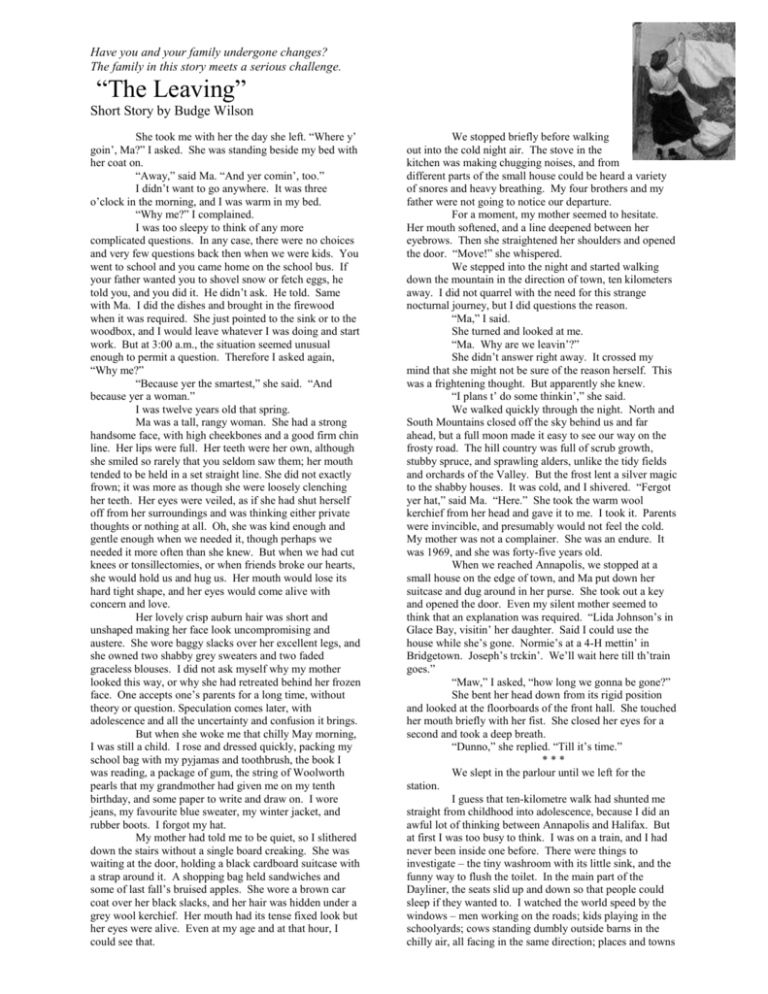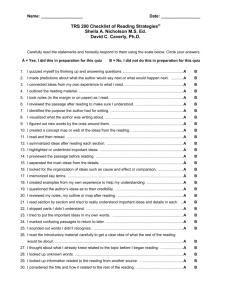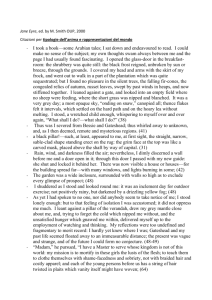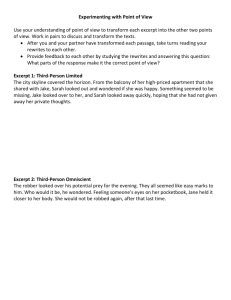"The Leaving" by Budge Wilson
advertisement

Have you and your family undergone changes? The family in this story meets a serious challenge. “The Leaving” Short Story by Budge Wilson She took me with her the day she left. “Where y’ goin’, Ma?” I asked. She was standing beside my bed with her coat on. “Away,” said Ma. “And yer comin’, too.” I didn’t want to go anywhere. It was three o’clock in the morning, and I was warm in my bed. “Why me?” I complained. I was too sleepy to think of any more complicated questions. In any case, there were no choices and very few questions back then when we were kids. You went to school and you came home on the school bus. If your father wanted you to shovel snow or fetch eggs, he told you, and you did it. He didn’t ask. He told. Same with Ma. I did the dishes and brought in the firewood when it was required. She just pointed to the sink or to the woodbox, and I would leave whatever I was doing and start work. But at 3:00 a.m., the situation seemed unusual enough to permit a question. Therefore I asked again, “Why me?” “Because yer the smartest,” she said. “And because yer a woman.” I was twelve years old that spring. Ma was a tall, rangy woman. She had a strong handsome face, with high cheekbones and a good firm chin line. Her lips were full. Her teeth were her own, although she smiled so rarely that you seldom saw them; her mouth tended to be held in a set straight line. She did not exactly frown; it was more as though she were loosely clenching her teeth. Her eyes were veiled, as if she had shut herself off from her surroundings and was thinking either private thoughts or nothing at all. Oh, she was kind enough and gentle enough when we needed it, though perhaps we needed it more often than she knew. But when we had cut knees or tonsillectomies, or when friends broke our hearts, she would hold us and hug us. Her mouth would lose its hard tight shape, and her eyes would come alive with concern and love. Her lovely crisp auburn hair was short and unshaped making her face look uncompromising and austere. She wore baggy slacks over her excellent legs, and she owned two shabby grey sweaters and two faded graceless blouses. I did not ask myself why my mother looked this way, or why she had retreated behind her frozen face. One accepts one’s parents for a long time, without theory or question. Speculation comes later, with adolescence and all the uncertainty and confusion it brings. But when she woke me that chilly May morning, I was still a child. I rose and dressed quickly, packing my school bag with my pyjamas and toothbrush, the book I was reading, a package of gum, the string of Woolworth pearls that my grandmother had given me on my tenth birthday, and some paper to write and draw on. I wore jeans, my favourite blue sweater, my winter jacket, and rubber boots. I forgot my hat. My mother had told me to be quiet, so I slithered down the stairs without a single board creaking. She was waiting at the door, holding a black cardboard suitcase with a strap around it. A shopping bag held sandwiches and some of last fall’s bruised apples. She wore a brown car coat over her black slacks, and her hair was hidden under a grey wool kerchief. Her mouth had its tense fixed look but her eyes were alive. Even at my age and at that hour, I could see that. We stopped briefly before walking out into the cold night air. The stove in the kitchen was making chugging noises, and from different parts of the small house could be heard a variety of snores and heavy breathing. My four brothers and my father were not going to notice our departure. For a moment, my mother seemed to hesitate. Her mouth softened, and a line deepened between her eyebrows. Then she straightened her shoulders and opened the door. “Move!” she whispered. We stepped into the night and started walking down the mountain in the direction of town, ten kilometers away. I did not quarrel with the need for this strange nocturnal journey, but I did questions the reason. “Ma,” I said. She turned and looked at me. “Ma. Why are we leavin’?” She didn’t answer right away. It crossed my mind that she might not be sure of the reason herself. This was a frightening thought. But apparently she knew. “I plans t’ do some thinkin’,” she said. We walked quickly through the night. North and South Mountains closed off the sky behind us and far ahead, but a full moon made it easy to see our way on the frosty road. The hill country was full of scrub growth, stubby spruce, and sprawling alders, unlike the tidy fields and orchards of the Valley. But the frost lent a silver magic to the shabby houses. It was cold, and I shivered. “Fergot yer hat,” said Ma. “Here.” She took the warm wool kerchief from her head and gave it to me. I took it. Parents were invincible, and presumably would not feel the cold. My mother was not a complainer. She was an endure. It was 1969, and she was forty-five years old. When we reached Annapolis, we stopped at a small house on the edge of town, and Ma put down her suitcase and dug around in her purse. She took out a key and opened the door. Even my silent mother seemed to think that an explanation was required. “Lida Johnson’s in Glace Bay, visitin’ her daughter. Said I could use the house while she’s gone. Normie’s at a 4-H mettin’ in Bridgetown. Joseph’s trckin’. We’ll wait here till th’train goes.” “Maw,” I asked, “how long we gonna be gone?” She bent her head down from its rigid position and looked at the floorboards of the front hall. She touched her mouth briefly with her fist. She closed her eyes for a second and took a deep breath. “Dunno,” she replied. “Till it’s time.” *** We slept in the parlour until we left for the station. I guess that ten-kilometre walk had shunted me straight from childhood into adolescence, because I did an awful lot of thinking between Annapolis and Halifax. But at first I was too busy to think. I was on a train, and I had never been inside one before. There were things to investigate – the tiny washroom with its little sink, and the funny way to flush the toilet. In the main part of the Dayliner, the seats slid up and down so that people could sleep if they wanted to. I watched the world speed by the windows – men working on the roads; kids playing in the schoolyards; cows standing dumbly outside barns in the chilly air, all facing in the same direction; places and towns I had never seen till then. My ma looked over at me and placed a comic book and a bag of peanuts on my lap. “Fer th’ trip,” she said, and smiled, patting my knee in an unfamiliar gesture. “Mind missin’ school?” she added. “No,” I said. But I did. I had a part in the class play, and there was a practice that afternoon. I was the chief fairy, and I had twenty-five lines, all of which I knew by heart already. But this trip was also a pretty special, if alarming, adventure. It had a beginning but no definite end, and we were still speeding toward the middle. What would Halifax be like? We never had enough money to have more than one ride on the Exhibition Ferris wheel at Lawrencetown; but here we were buying train tickets and reading comics and eating peanuts and travelling to heaven knows what expensive thrills. “Maw,” I asked, “where’d the money come from?” She looked at me, troubled. “Don’t ask,” she said. “I’ll tell you when you’re eighteen.” Eighteen! I might as well relax and enjoy myself. But I wondered. Before long, she fell asleep, and I felt free to think. Until then, it was almost as though I were afraid she would read my thoughts. Why had we left? How long would we be gone? How would Pa and my brothers cook their dinner? How would they make their beds? Who would they complain to after a hard day? Who would fetch the eggs, the mail, the water, the woods, the groceries? Who would wash their overalls, mend their socks, put bandages on their cuts? It was inconceivable to me that they could survive for long without us. *** When we reached Halifax, we went to what I now realize was a cheap and shabby hotel in the South End of the city. But to me it seemed the height of luxury. The bed was made of some kind of shiny yellow wood. The bedspread was an intense pink, with raised nubbles all over it. A stained spittoon sat in the corner. There was actually a sink in the room, with taps that offered both cold and hot water. A toilet that flushed was down the hall. I checked under the bed; there was no chamber pot. But who needed it? There were two pictures on the walls – one of a curlyheaded blonde, displaying a lot of bare flesh, and another of three dead ducks hanging upside down from a nail. I spent a lot of time inspecting both of these pictures. Halifax was a shock to me. How could the buildings be so huge and the stores so grand? Here I was in the province’s capital city before I really understood what a capital city could be. I admired the old stone buildings with their carvings around the doors and windows. I stretched my neck to see the tops of the modern apartments, with their glass and concrete reaching up into the clouds. The buses and cars alarmed me as they rushed up and down the long streets, but they excited me too. The weather changed; it was warm and comforting, and the wind was gentle and caressing. We went down the hill to the harbor, and saw the bridge; rooted in the ground and in the sea bottom, it lifted its enormous metal wings into the sky. I marveled that a thing so strong could be so graceful, so beautiful. What a lovely way, I thought, to get from one place to another. We walked across the bridge to Dartmouth, and watched the ships, far below, headed for Europe, for Africa, for the distant North. My mother, who had started to talk, told me about all these things. It was as though she were trying to tell me something important, but didn’t want to say things right out. “They’re goin’ somewhere,” she said. Later on, she took me to Dalhousie University, and we walked among the granite buildings and beside the playing fields. “If yer as smart as the teacher claims,” she said, “maybe you’ll come here some day t’ learn.” I thought this highly unlikely. If we couldn’t afford running water, how could we afford such a thing as that? I said so. “They’s ways,” she said. We walked up and down Spring Garden Road and gazed in the big windows. I looked at a candy store with at least five million kinds of candy, shops with dresses so fancy that I could scarcely believe it, shelves full of diamonds and gold and sparkling crystal. “Is there ways for all this, too?” I asked my mother. She hesitated. “Don’t need all that stuff,” she concluded. The weather was dazzling – a sunny Nova Scotia May day. We walked through the huge iron gates into the Public Gardens and ate our sandwiches and apples beside the duck pond. I kicked off my rubber boots and wiggled my toes in the sun as I watched the swans and the yellow ducklings. The Gardens were immense, full of massive and intricate flowerbeds, winding paths, and strange exotic trees. There were statues, a splashing fountain, an elaborate round bandstand, and a little river with a curved bridge over it. Lovers strolled arm in arm, and children shrieked with laughter as they chased the pigeons. I asked Ma why everyone seemed so happy. “Dunno,” she said. “Weather does things t’ people.” She looked around. “And maybe some of them’s free,” she added. On the second day, we watched women racing to work in the morning, mini-skirts flipping, heels clicking, faces eager, faces tense. We looked on as shopping women pulled twenty-dollar bills out of their purses as though they were nickels. We visited the courthouse and looked at the pictures of the stern-faced judges as they watched us from the walls. “They fixes things what aren’t right,” said Ma. I wondered how. “But not always,” she added. We spent an hour in the public library, looking at the shelves and shelves of books, smelling their wonderful book smells, idly turning the pages. On a book dolly, she picked up a copy of The Feminine Mystique. She, who had not to my knowledge read a single book since I was born, said shyly, “I read this book.” I was astonished. “You!” I exclaimed. “How come? When?” “I kin read!” she retorted, miffed. “Even if y’ leaves school in Grade Five, y’ kin read. Y’ reads slow, but y’ knows how.” “But where’d you get it?” I demanded, amazed. “Y’ remember that day the Salvation Army lady brought us that big box o’ clothes?” she asked. “Yer pa was mad and said we didn’t need no charity. But I hid the box, and after a time he forgot about it. Well, there was other things in there, too – an egg beater, some toys what I gave to Lizzie’s kids, even a string o’ yellow beads and a bracelet that I bin savin’ fer you. And some books. There was comic books and that big colourin’ book y’ got fer Christmas, and them Popular Mechanics magazines the boys read, and a coupla others. And this.” She placed the palm of her hand on the book. “Seemed like it was for me, special. So I read it. She was real tough goin’, but I read every word. Took me near a year. Finished it last Thursday.” I could hardly believe it. My ma didn’t even read recipes. She kept them all in her head. I asked, “Was it good?” She thought for a moment before answering. “She was a real troublin’ book. But she was good.” I couldn’t understand that. “If it was so troublin’, why was it so good?” She answered that one without hesitation. “Found I weren’t alone,” she said. She stroked its cover tenderly before putting it back on the dolly. I liked the library, with all the silent people bent over their books, and the librarians moving soundlessly to and fro. I wasn’t used to quiet places. In the afternoon, we climbed the Citadel and went into its museum, walking up and down among the sea things, old things, rich things. Later on, we went to what I thought was a very fancy restaurant. There were bright, shiny chrome tables with place mats of paper lace and green glass ashtrays. I ordered a hot dog and chips, because that was my favourite meal. My mother, her mouth now soft and cheerful, ordered something with a strange name. “Ain’t gonna come all this way and spend all th’hen money jest t’ eat what I kin eat at home,” she said. The egg money! So that was it. I let on I didn’t notice. But a thrill of fear ran through me. I wondered what Pa would do. In the evening we returned early to the hotel, and I slept deeply, but with strange and troubled dreams. *** On the third day, Ma said, “It’s time. T’day we go home.” I asked why. “Because,” she said. “Because why?” I insisted. She was silent for a moment, and then said again, “It’s time.” I was pleased. It had been an interesting trip, but it frightened me a little because there were no explanations, no answers to my unspoken questions. Besides, I was afraid that someone else would get to be chief fairy in the school play. “Have you done yer thinkin’?” I asked. She looked at my strangely. There was hope in her look and an odd fierce dignity. “I has,” she said. *** We took the bus home instead of the train, and it was late afternoon when we arrived in Annapolis to start the ten-kilometre climb to our farm. The day was damp and cold, and I wore my mother’s wool kerchief again. We were very quiet, and I knew she was nervous. Her mouth was back in its taut line, and her eyes were troubled. But even in the wind, her shoulders were straight and firm, and I could feel a difference in her. Fearful though her eyes were, she was fully alert, and you could sense a new dogged strength in the set of her face. There was no such strength in me, except such as I derived from her. Home is home when you are twelve, and I did not want to live a tourist’s life in Halifax forever. But I worried every step of the ten long kilometers. As we turned the bend at Harrison’s Corner, we could see the farm in the distance. It was as though I were seeing it for the first time. The house had been white once, but it had needed paint for almost nineteen years. Around the yard was confusion of junk of all kinds: two discarded cars – lopsided and without wheels – an unpiled jumble of firewood, buckets, a broken hoe, rusty tools, an old oil drum for burning garbage. To the left were the few acres of untidy fields dotted with spruce trees and they grey skeletons of trees long dead of Dutch elm disease. To the right, close to the henhouse, was the barn – small and unpainted, grey and shabby in the dim afternoon light. We could hear the two cows complaining, waiting for milking time. When we opened the kitchen door, they were all there. My four big brothers were playing cards at the table, and my father was sitting by the kitchen stove. I had forgotten how darkly handsome he was. But because it was not Sunday, he was unshaven, and his eyes glared out at us from beneath heavy black eyebrows. Pa rose from his chair and faced us. He was tall, and his head almost reached the low ceiling. He seemed to fill the entire room. His voice was low and threatening. “Where you bin, woman?” he said. She spoke, and I was amazed that she had the courage. Then I realized with a jolt that his words were little different in tone and substance from hundreds I had heard before: “How come my supper’s not ready, woman?” “Move smart, woman! I’m pressed fer time!” “Shut up them kids, woman!” “Move them buckets, woman! They’re in my way!” “This food ain’t fit t’ eat, woman. Take it away!” She spoke quietly and with dignity. “You is right to be angry, Lester,” she said. “I left a note fer y’, but I shoulda tole y’ before I left.” “Shut yer mouth, woman, and git my supper!” he shouted, slamming his hands down on the table. She moved to the centre of the room and faced him. “My name,” she began, and faltered. She cleared her throat and ran her tongue over her lower lip. “My name,” she repeated, this time more steadily, “is Elizabeth.” He was dumbfounded. My brothers raised their heads from their card game and waited, cards poised in mid-air. Pa looked at her. He looked at me. Then he looked at Jem and Daniel and Ira and Bernard, sitting there silent and still like four statues, waiting for his reaction. Suddenly my father threw back his head and laughed. His ugly laughter filled the little kitchen, and we all listened, frozen, wishing for it to stop. “‘My name is Elizabeth!’” he mocked, between choking guffaws, slapping his thighs and holding his stomach, and then he repeated himself and her, mincingly, “‘My…name…is…Elizabeth!’” Then his face changed, and there was silence. “Git over her ‘n’ make my supper, woman! I’m gonna milk them cows. But my belly is right empty, and y’ better be ready when I gits back from th’ chores!” I watched my mother. During the laughter, I could see her retreat for a minute behind her eyes, expressionless, lifeless, beaten. Then she took a deep breath and looked at him directly, squarely, with no fear in her face. Pain, yes, but no fear. My brothers looked down and continued their card game. “Act smart there, Sylvie,” she said to me, as soon as he had left. “I need yer help bad. You clean up, ‘n’ I’ll fix supper.” She was already moving swiftly about the kitchen, fetching food, chopping onions, peeling potatoes. In the sink was a mountainous pile of dirty dishes. Open cans, crusted with stale food, cluttered the counter. I surveyed the scene with distaste. “Ma,” I asked, complaining like the true adolescent that I had now become, “how come they couldna washed the dishes themselves? They goes huntin’ and fishin’ and ha lotsa little vacations in th’ winter. We always do their work for them when they’re gone. How come we gotta clean up after their mess?” “Listen,” she said, cutting the potatoes and dropping them into the hot fat, “the way I sees it is y’ kin ask fer kindness or politeness from time t’ time. But y’ can’t expect no miracles. It’s my own fault fer raisin’ four boys like they was little men. Yer pa’s ma did the same thing. She aimed t’ raise a boy who was strong and brave, with no soft edges.” She wiped her forehead with the back of her hand. “Al along I bin blamin’ men fer bein’ men. But now I see that oftentimes it’s the women that makes them that way.” It was a long, long speech for my ma. But she went on. “The boys is seventeen, eighteen, nineteen, and twenty years old. Y’ can’t start makin’ ‘em over now. They’s set.” Then she smiled wryly, with a rare show of humour. She bowed formally in the direction of the card game. “I apologizes,” she said, “to your future wives.” Then she stopped, and looked from one son’s face to the next, and so on, around the table. “I loves you all, regardless,” she said softly, “and it’s worth a try. Jem” -she spoke to the youngest- “I’d be right grateful if you’d fetch some water for Sylvie. She’s real tired after the long walk.” Jem looked at his brothers, and then he looked at her. Water carrying was woman’s work, and she knew she was asking a lot of him. He rose silently, took the bucket from her, and went outside to the well. “And you,” she said, addressing Daniel and Ira and Bernard, “One snigger out of you, and yer in bad trouble.” I’m sure she knew she was taking an awful chance. You can say a thing like that to little boys, but these were grown men. But no one moved or so much as smiled when Jem returned. “I thank you right kindly,” said Ma, thereby delivering a speech as unusual as her other one. *** You could say, I suppose, that our leaving made no large difference in my mother’s life. She still worked without pay or praise, and was often spoken to as though she were without worth or attraction. He days were long and thankless. She emptied chamber pots and spittoons, scrubbed overalls and sheets on her own mother’s scrub board, and peeled the frozen clothes from the line in winter with aching fingers. But not all things remained the same. She now stood up to my father. Her old paralytic fear was gone, and she was able to speak with remarkable force and dignity. She did not nag. Nagging is like a constant blow with a small blunt instrument. It annoys, but it seldom makes more than a small dent. When she chose to object to Pa’s cruel or unfair behavior, her instrument was a shining steel knife with a polished cutting edge. A weapon like that seemed to make my father realize that if he went too far she would leave. After all, she had done it once before. And this time, she might not return. So there were changes. One day, for no apparent reason, he started to call her Elizabeth. She did not let on that this was remarkable, but the tight line of her mouth relaxed, and she made him a lemon pie for supper. She fixed up the attic storeroom as a workroom for herself. The boys lugged up her treadle sewing machine, and she brought in an old wicker chair and a table from the barn. It was a hot room in summer and cold in winter, but it was her own place – her escape. She made curtains from material bought at Frenchy’s, and hooked a little rug for the floor. No one was allowed to go there except her. She always emerged from this room softer, gentler, more still. I never did hear a single word about the missing egg money. Maybe Pa didn’t notice, or perhaps Ma attacked the subject with her sharp-edged knife. Possibly it was the egg money that sent me to Dalhousie – that and my scholarship and my summer jobs. I never asked. I didn’t really want to know. When I was home last February during the term break, I stole a look into Ma’s attic room. There were library books on the table, material on the sewing machine, paper piled on the floor for her letters to me and to the boys. I respected her privacy and did not go in. But the room, even in that chilly winter attic, looked like an inviting place. My ma is now fifty-five, and has a lot of life still to live. My pa is fifty-eight. He still shaves once a week, and he has not yet cleared up the yard. But he often speaks to my mother as though she were more of a person and less of a thing. Sometimes he says thank you. He still has a raging temper, but he is an old dog, and new tricks come hard. He loves my mother and she him, with a kind of love that is difficult for my generation to understand or define. In another time and in another place, the changes could have been more marked. But my mother is a tough and patient woman, and these differences seem to be enough for her. Her hair is worn less severely. Her mouth is not set so straight and cold and firm. She talks more. She has made a pretty yellow blouse to wear with her baggy slacks. She smiles often, and she is teaching her two grandsons how to wash dishes and make cookies. *** I often wonder about these things: but when my mind approaches the reasons for all that has happened, my thinking slides away and my vision blurs. Certainly the book and the leaving do not explain everything. Maybe my mother was ready to move into and out of herself anyway; and no one can know exactly what went on in her thoughts before and after she left. Perhaps she was as surprised as I was by the amount of light and warmth she let in when she opened the door to step into the dark and frosty morning. But of that strange three-day departure, I can say, as Ma did of her book, “She was a real troublin’ trip. But she was good.” Group Assignment K T C A 7 24 17 52 TOTAL /100 PART A Vocabulary (24T) Record the definition for each of the following words. Find the word in the short story and record the entire sentence. tonsillectomies auburn nocturnal austere dumbfounded slithered invincible guffaws inconceivable caressing intricate wryly PART B Short Answer (17C 46A) Respond to the following questions in complete sentences. 1. At what time does the story begin? (1C 1A) 2. Who is the narrator? Name the members of the narrator’s family. (1C 1A) 3. The narrator tells us that there were “no choices and few questions asked back then.” Describe life in Sylvie’s home. Record a quotation to support your response. (1C 3A) 4. Identify the setting in which the story takes place. (1C 5A) 5. How old is the narrator’s mother? (1C 1A) 6. Why did the narrator not want to miss school? Record a quotation to support your response. (1C 2A) 7. What is a spittoon? (1C 1A) 8. Describe Halifax. (1C 2A) 9. What book does the narrator’s mother examine at the public library? What does she say about this book? (1C 2A) 10. Explain the phrase “found I weren’t alone.” (1C 2A) 11. What does the narrator notice about her mother’s facial expression once she is in Halifax? Establish a comparison with her appearance at the beginning of the story. Record two quotations to support your response. What do the narrator’s observations indicate? (1C 5A) 12. Describe Elizabeth’s past relationship with her husband. Record a quotation to support your response. (1C 2A) 13. Explain the meaning of the following quotation: “All along I bin blamin’ men for bein’ men. But now I see that oftentimes it’s the women that makes them that way.” (1C 3A) 14. Is Elizabeth able to change her husband and sons? Find quotations to support your response. (1C 4A) 15. Record a quotation which describes the attic room. What does this room tell you about Elizabeth? (1C 3A) 16. Why is the egg money important? (1C 1A) 17. What has the narrator learned as a result of her mother’s experience? Record a quotation to support your response. (1C 4A) Part C Plot Graph (7K 10A) Create a plot graph for the story; draw and label the plot graph then insert events along the graph.








